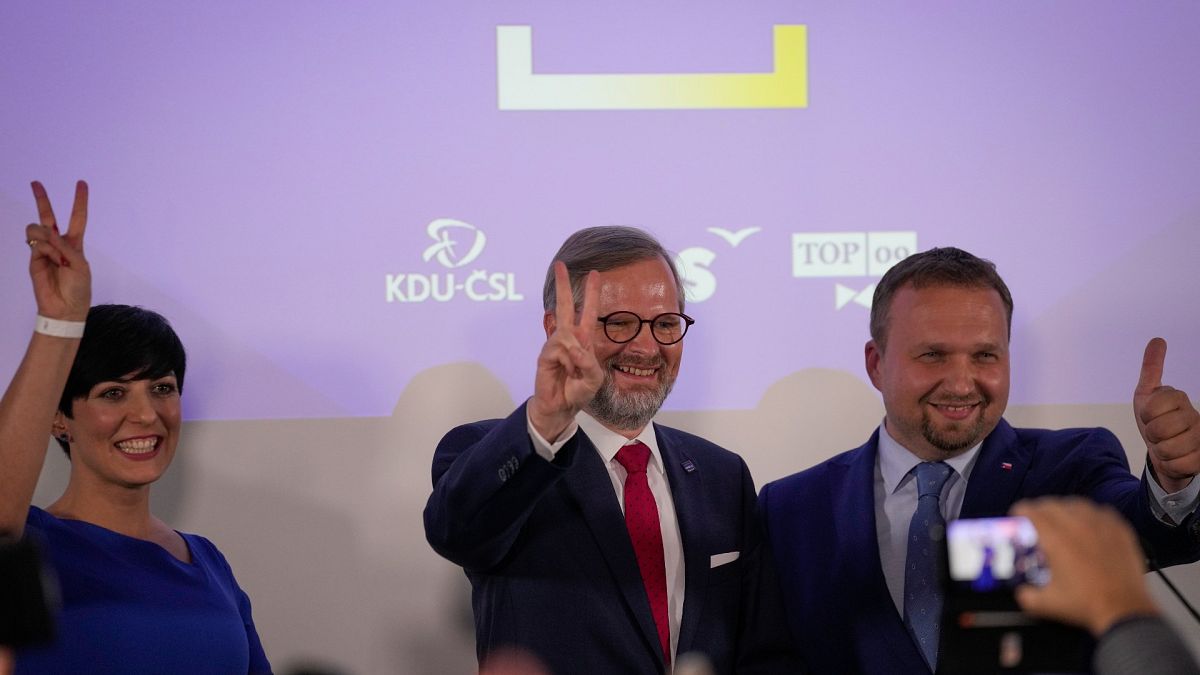Together and the centre-left bloc announced on Saturday evening that they have signed a memorandum of their will to govern together.
The centre-right Together coalition on Saturday narrowly won the Czech parliamentary election, ahead of Prime Minister Andrej Babis's ANO party, but failed to secure a majority, results show.
According to the country's Statistics Office, Together — comprising the conservative Civic Democratic Party and Christian Democrats and the liberal-conservative TOP 09 party — gathered 27.79% of the vote.
The bloc was one of two coalitions, involving five parties, formed ahead of the election with the aim to oust Babis from power.
The centrist ANO movement came a very close second with 27.12% of the vote, while the centre-left coalition made up of the liberal Pirate Party and STAN — a group of mayors and independent candidates — came third with 15.62%.
The electoral system means ANO secured 72 of the parliament's 200 seats, ahead of Together's 71. The centre-left bloc will have 37 lawmakers.
But Babis, a populist 67-year-old billionaire, had led a minority coalition government with the support of leftist Social Democrats and the Communists. Both parties failed to gather at least 5% of the vote, according to the preliminary results, and should thus fail to secure any parliamentary seats for the first time.
Together and the centre-left bloc announced on Saturday evening that they have signed a memorandum of their will to govern together.
“The two democratic coalitions have gained a majority and have a chance to form a majority government," Petr Fiala, Together's leader and its candidate for prime minister. said.
That would mean ANO would then be in opposition.
The result means “an absolute change of the politics in the Czech Republic,” analyst Michal Klima told Czech public television. “It stabilises the country’s position in the West camp.”
Babis and the Pandora Papers
The election, held across Friday and Saturday morning, took place in the immediate wake of the International Consortium of Investigative Journalists reporting details of Babis' financial dealings in a project dubbed the “Pandora Papers."
The consortium's findings alleged Babis put over $20 million (€17.3 million) into shell companies to buy 16 properties in France. The Pandora Papers presented details of how many of the world’s richest and most powerful people allegedly hide their wealth from tax collectors.
Babis has denied wrongdoing.
As he cast his ballot in the northern town of Lovosice on Friday, he had called for "stability in these unstable times".
"We should not change the government now," he insisted.
During his aggressive campaign, Babis portrayed migration as a threat even though his country is not a typical destination for asylum-seekers and refugees. He also condemned the 27-member EU's plan to tackle climate change.
He also didn't rule out forming a coalition with Freedom and Direct Democracy (SPD), an anti-migrant, anti-Muslim party that wants to lead the Czech Republic out of the EU and to hold a referendum on its NATO membership. The SPD gathered about 9.6% of the votes, which should translate into 20 seats in the lower house — not enough for the two parties to secure an outright majority.
Babis conceded that ANO "didn't expect to lose" but said of the defeat: "We accept that."
He still declared the election results “excellent.”
Babis to meet President Zeman
The leader of the strongest party usually gets a chance to form a new government. President Milos Zeman, Babis' close ally, didn't immediately comment but previously indicated that he will first appoint the leader of the winning party, not the winning coalition, to try to form a new government, which would be Babis.
“We're the strongest party,” Babis said. “If the president asks me to create a government, I'll open the negotiations about it.”
Babis will meet with President Milos Zeman on Sunday morning.
Any new government has to win a parliamentary confidence vote to rule, however, and Babis and his potential partner, the Freedom party, don't have enough support for that.
Fiala, the leader of Together, pledged to pursue different politics.
“It doesn't matter who you voted for,” he said after the results were announced. “We're all Czech citizens who have to live together as neighbours, friends and colleagues. That's what unites us all.”
Despite their differences on many issues, including climate change, same-sex marriage and the adoption of the euro, the five parties in the two coalitions all support EU and NATO membership.
Creating a five-party coalition “will be painful and will need to include lots of concessions from both sides. It should be based on the topics they are able to agree on,” Petr Just, an analyst from Metropolitan University Prague, said.
